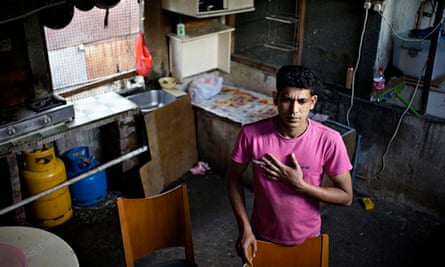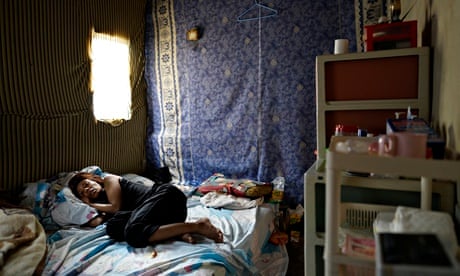Shortly after leaving prison, Mohammed went to the grocery store where he was last arrested, and stole another item. Then he waited quietly for the police to come. "It's no good outside. It's better in prison," he said, days after his latest release. "You have food; you can work; you have a room."
Mohammed, who fled to Hong Kong from Sri Lanka 10 years ago after his father and brothers were killed, has concluded that it treats its prisoners better than those seeking protection.
When Edward Snowden surfaced here last summer, his case brought international scrutiny of Hong Kong's handling of asylum issues. The NSA whistleblower quickly moved on, but thousands of others are left in limbo in squalid conditions, even living in old animal sheds.
"Up until the Snowden case, it was apparent that the whole world turned a blind eye to the plight of asylum seekers in Hong Kong," said Robert Tibbo, the American's lawyer here and a director of Vision First, a NGO supporting refugees. "What's disappointing is that Hong Kong's government and society, despite its immense wealth and resources, is refusing recognised asylum seekers to settle in Hong Kong. This is not a proper or mature policy for such a wealthy and influential global stakeholder."
Hong Kong has one of the world's most draconian immigration systems. It only issues rulings on torture claims, and even those are rarely favourable. Just 11 people from 13,000 torture cases in over 21 years have been accepted, says Vision First, with successful applicants resettled in a third country.

Recent legal decisions mean the government has had to extend protection to those who have suffered cruel, inhuman or degrading treatment and punishment. But Vision First's founder, Cosmo Beatson, describes "a culture of rejection". Australia, which draws asylum seekers from relatively similar locations, accepted 74% of Pakistani applicants in 2011-12 – while Hong Kong has not accepted one of several thousand Pakistani torture claims over two decades. Some applicants say they have been waiting six years or more without even being interviewed, and are confused by the repeated changes to procedures. It is illegal for asylum seekers to work, with those caught jailed for up to three years.
Beatson says extended uncertainty and squalid living conditions have led to relationship breakdowns and mental illness.
"I lost 10 years of my youth in Hong Kong," said Mohammed, who has dark circles beneath his eyes and a restless, nervy manner despite his smile. "I came as a youth and now I'm old. I'm not married. In another 10 years? I'll be 42. Better that I will die."
The government is increasing allowances and, crucially, promising to provide rent deposits for the first time. But even then the total package of support will be about 25% below the official poverty line. Rent is HK$1,200 (£92) a month. In Nai Wai, in the New Territories, that buys a compartment in a former pigshed – most residents are Muslim – with a breezeblock base, corrugated metal walls and a metal roof covering only part of the building. There is exposed wiring under an open section.
A feverish toddler idles at the doorway, by a stray mattress with "love" spray-painted across it. The concrete floor slopes downwards from the path, guaranteeing floods in wet weather. For privacy and to keep the rain out, boards found on rubbish dumps have been nailed across windows without glass. The air is fetid. Twenty people live here, cooking in the "kitchen" – a sink and burners in what used to be the pen for piglets, next to the toilet. At a building nearby, a sock is tied over the single tap in the kitchen-bathroom to filter out the worst of the dirt. There is no way to keep out rats and snakes, because a tree grows through the building.
And while the rent allowance will soon rise to HK$1,500, asylum seekers say landlords are already increasing their rents accordingly.
International Social Services Hong Kong, the NGO which oversees welfare for asylum seekers, is supposed to inspect accommodation. A spokeswoman did not respond to specific queries about the Nai Wai homes but said in general ISS-HK conducted spot checks and home visits "to assess the hygiene, home environment and safety condition" and would advise people to move if accommodation was below standard. She added that in some cases claimants decided to stay put despite such advice.
Hong Kong's levels of welfare are generally low – there are life-long residents in tiny "cage homes" – but asylum seekers say discrimination and hostility compounds the problem of low incomes in an expensive city. "Everyone ignores you. When you show them the paper [showing you are an asylum seeker], they don't take you seriously," said one.

A spokesperson for Hong Kong's security bureau said the region's circumstances were unique: "Being densely populated, relatively prosperous and a regional transportation hub with long coastlines render a strong need to maintain a firm and effective immigration control policy to safeguard the interest of Hong Kong people against possible influx of economic migrants."
Beatson says accepting existing claims en masse and refusing any future applications would be kinder than continuing with the current system. "It would be better than the mirage of protection – people are thirsty and they think there's water here," he said.
Hong Kong's anxieties about asylum may in part reflect the huge numbers of "boat people" who arrived from Vietnam in the late 1970s, although they were overwhelmingly resettled or repatriated. Tibbo argues the numbers then were far larger – 200,000 according to the UNHCR – and Hong Kong was much poorer. Now the government runs large financial surpluses.
"When a human comes here they have hope. A few years later, when they realise that hope is fake, maybe he gets frustrated and starts developing anger and hatred," said Cici, who fled persecution in Cameroon after converting from Islam to Christianity. "They play with us like the ball in a football match."
The well-travelled former entrepreneur, who has two degrees and speaks multiple languages, says the current system is wasteful as well as degrading. Allowing asylum seekers to work while they wait could help Hong Kong grow, he said."What's shocking and really disturbing is how the government can put a lot of money to pay [officials] and lawyers and for [slum] housing – just to stop people. This is pure wickedness."
The names of asylum seekers have been changed to protect their identities.

Comments (…)
Sign in or create your Guardian account to join the discussion